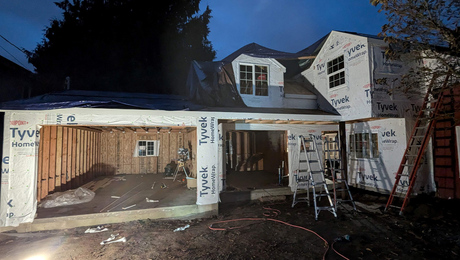Can I use PEX for my baseboard heat instead of copper? I am already using it for my water supply. Jeffysan
Discussion Forum
Discussion Forum
Up Next
Video Shorts
Featured Story

The FHB Podcast crew takes a closer look at an interesting roof.
Featured Video
How to Install Exterior Window TrimHighlights
"I have learned so much thanks to the searchable articles on the FHB website. I can confidently say that I expect to be a life-long subscriber." - M.K.














Replies
They use copper in baseboards for a reason - it has high thermal conductivity. PEX will do a poor job of transferring heat to the fins/air when compared to copper. You can use PEX to plumb between radiators.
I'm assuming you mean to connect them. Yes, you can. You'll want to use a PEX tubing with an oxygen barrier meant for heating, like Wirsbo's HePex. You'll also want to pay attention to the size of the tubing, the length of the run, and the amount of radiation on the loop so that you can size the tubing properly. The tubing manufacturer or supplier should have the information available to make those decisions. In general, 5/8" PEX will feed loops that would normally be run in 3/4" copper. You'll also need the correct fittings to interface the PEX to the baseboard.
Yes, but the heat transfer properties and operating temperatures are different.
http://www.aimradiantheating.com/store/slimline.html
Npitz has it exactly right wirsbo has been around the heating world long before it was ever used for plumbing.
so wirsbo the way to go? On the whole project? jeffysan
Like npitz said to connect point A to point B I have never seen wirsbo baseboards. But I haven't seen everything yet.
When using wirsbo I prefer the expansion style connectors verses the compression connectors they both work fine but the compression style is a bit bulky.
Expansion tool may be hard to find but a lot of supply houses do rent the tool.
This is great! I love learning a new subject from knowledgeable people.
I hope there is a hydronic heating system in my future home design.
A question about what exactly is in those pipes. My wife is chemically injured and wants to know if there is just plain water in a heating loop or if there is a corrosion proofing chemical added.
I'm talking about a residential application. Would there be any difference in a system with plastic pipe verses copper?
Thank you!
Well the day we stop learning is the day they nail the coffin shut. As far as additives ,way too many to list to be practical.
plastic verses copper my experience is neither needs additives.
boilers & radiators & pumps to name a few are things that use corrosion inhibitors to extend their life.
I mainly do commercial & industrial , as well as corrosion inhibitors we use heat transfer liquids ( glycol ) for extreme working conditions.